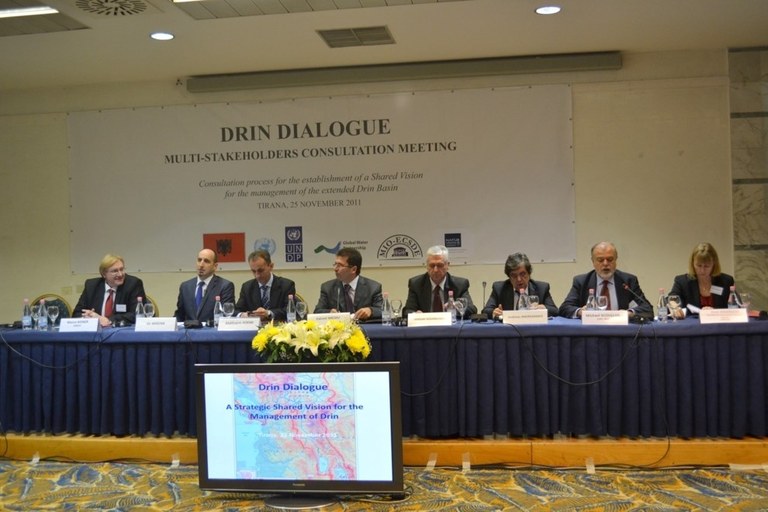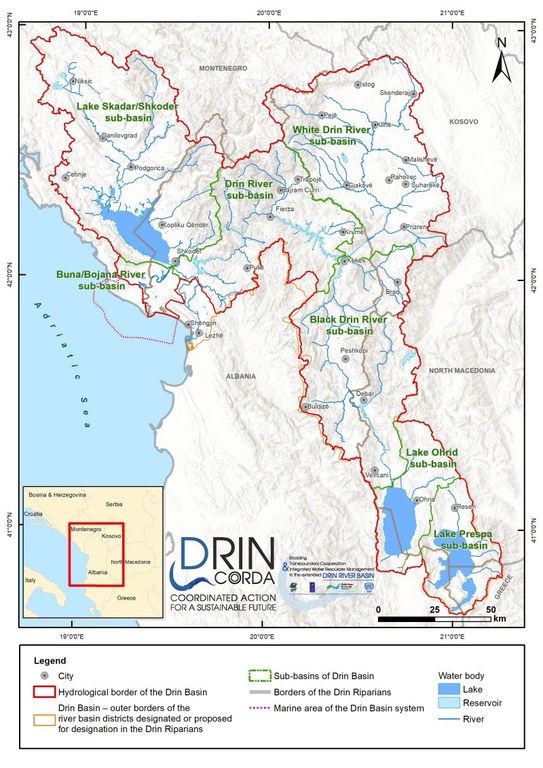A significant milestone in the promotion of joint action for the coordinated integrated management of the shared water resources in the Drin Basin has been achieved with the development and endorsement by the representatives of the Drin Riparians of the first-ever Flood Risk Management Plan and Strategy for the Drin River Basin .
Over the last decades, the Drin Basin has experienced increasingly extreme weather events, driven by shifting natural patterns and the impacts of climate change with an estimated total flood-related losses across the entire basin amounting to approximately USD 10 million per year. Meanwhile, the institutional framework for flood risk management among the Riparians, is fragmented in terms of competencies and suffers from overlapping responsibilities of institutions. In addition, National Flood Management Plans developed recently by the Drin Riparians, according to the EU Floods Directive requirements, do not include the transboundary impacts although the EU acquis requires coordination and joint development of the plans for shared river basins. National Flood risk management investments are rarely supported by robust climate-risk informed analysis for infrastructure works and there are no comprehensive financial risk transfer mechanisms to assist in mitigation.
In response, the first-ever Flood Risk Management Strategy and Action Plan for the Basin were developed under the “Integrated Climate-resilient Transboundary Flood Risk Management in the Drin River Basin in the Western Balkans” Project (2019–2024).
The Drin RFM Strategy's long-term vision reaffirms the shared vision of the MoU and the short-term vision for the Drin’s Communities to become resilient and able to adapt to future climate change challenges.
The newly approved Drin FRM Strategy and Action Plan outline a vision for a climate-resilient Drin Basin over the next five years, fully aligned with the objectives of the Drin MoU, emphasizing flood preparedness, sustainable development, and enhanced cooperation among the Riparians. The long-term goal of the strategy is to safeguard shared water resources and ecosystems, promote regional development, and ensure that communities in the Drin Basin are resilient to future flood risks, especially in the face of climate change.
It includes an array of measures such as prevention, preparedness and recovery measures from floods that complement protection measures that countries usually implement. Its participatory approach fostered dialogue accross local, national and transboundary levels and ensured that the strategy reflects the basin's ecological, social, and economic complexities.
Guided by and aligned with the objectives outlined in the Drin Basin Memorandum of Understanding (MoU) and the Drin Coordinated Action process, both documents aim to stengthen flood preparedness, improve risk management, and foster mutual support across the basin. The Strategy serves as a guiding document that outlines the principles, strategic objectives, and goals to be achieved through the Municipal/Sub-basin Flood Risk Mitigation Action Plans, all within the framework of a shared transboundary river approach.

The main objective of the MoU is to “Promote joint action for the coordinated integrated management of the shared water resources in the Drin Basin, as a means to safeguard and restore, to the extent possible, the ecosystems and the services they provide, and to promote sustainable development across the Drin Basin”. The Parties to the MoU agreed to undertake concrete short, medium and long-term action to address a number of issues, towards the integrated management of the Basin
Coordinated Action (Drin CORDA) in the Drin Basin began with the signing of the Drin Memorandum of Understanding (MoU) in Tirana in 2011, by the Ministers of the water and environment management competent ministries of the Drin Riparians, namely Albania, Kosovo*, Montenegro and N.Macedonia. The Drin MoU provided the political framework for and defined the context of cooperation among the Drin Riparians. Drin Coordinated Action is guided by an institutional structure comprising joint bodies with officially appointed members and The Drin Core Group (DCG) was given the mandate to coordinate actions for the implementation of the MoU.

The spatial scale of the Drin FRM Strategy and the Plan is the transboundary river basin.
The development of the Strategy and the Plan were guided by the following steps:
- Analysis of the main causes as well as consequences of flooding for each one of the water systems that comprise the Drin basin, together with the main barriers and enablers that could affect the achievement of the strategic objectives and goals of the transboundary Drin FRM Strategy.
- Analysis of the institutional framework of each Riparian for the flood risk management as well as the Areas of Potential Flood Risk of Mutual Concern for each one of the water bodies that comprise the Drin basin.
- The development of a set of harmonized transboundary flood risk management measures, fully aligned with the EU Flood Directive Reporting Guidance, synthesizing a set of measures that have been identified for each Riparian. Each action covers an aspect of flood risk management which are prevention, protection, preparedness, recovery and review.
- Development of the Transboundary Flood Risk Management Plan based on the above set of measures.
- The critical factors that can favor or negatively affect the operational implementation of the Transboundary FRM Action Plan. Among others the need of enough financial resources to fund the execution of the different measures, an integrated multi-sector approach (NEXUS), the strengthening of key institutions, and the effective involvement of local communities.
- The Plan was set into public consultation (9 workshops and over 150 participants) allowing for the integration of local insights, scientific expertise, and institutional frameworks into a comprehensive flood management approach.

The Drin Flood Risk Management Plan was based on 3 Axes. 60 % of the Flood risk management measures correspond to Axis of Action I - Ensure Flood Risk Awareness, Preparedness & Good Governance. The remaining 40 % is homogeneously distributed between Axis II and Axis III.
Meeting in Tirana and future steps:
At the Drin Core Group (DCG) meeting held in Tirana in March 2025,officially appointed representatives of the Riparians, namely Albania, Kosovo*, Montenegro and N.Macedonia and committed to integrating the regional measures outlined in the Strategy into their national flood risk management planning processes. This integration will support the mainstreaming of transboundary approaches into national policies and promote better harmonization among national flood risk management plans. Ultimately, these efforts will enable a more coordinated and effective management of floods across the basin and significantly contribute to the implementation of the Drin Memorandum of Understanding (MoU).
The implementation of the Strategy and Action Plan will be overseen by the joint governance structures established under the Drin Coordinated Action (Drin CORDA) process. Continued support is expected through mobilization of financing from international financial institutions.
The Adaptation Fund supported project entitled “The Integrated Climate-Resilient Transboundary Flood Risk Management in the Drin River Basin in the Western Balkans” (Drin FRM Project 2019-2025) is executed by the UNDP Istanbul Regional Hub (IRH). For the delivery of specific regional activities, the IRH has engaged the Global Water Partnership Organization (GWP) as a Responsible Party for the Project’s Outcome 2.
*This designation is without prejudice to positions on status, and is in line with UNSCR 1244/1999 and the ICJ Opinion on the Kosovo declaration of independence.
